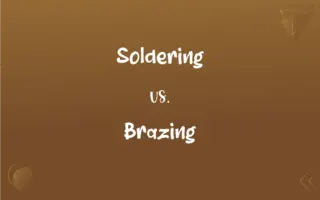Jeans vs. Pants: What's the Difference?
Edited by Aimie Carlson || By Harlon Moss || Updated on July 4, 2024
"Jeans" are denim trousers, typically blue, while "pants" is a general term for any outer garment covering the lower half of the body.

Key Differences
"Jeans" are a type of clothing that originated in the 19th century, primarily as workwear for laborers. These are trousers made from denim, a durable cotton twill fabric. Jeans often feature distinct metal rivets, primarily at the pocket joins, to enhance durability. "Pants," on the other hand, is a broader term used in American English to describe any piece of clothing worn on the lower part of the body, from the waist to the ankles.
Pants can come in a variety of fabrics, such as cotton, wool, linen, or synthetic materials. They can be formal, like dress pants worn with a suit, or casual, like sweatpants. Jeans, being more specific, are primarily made of denim, although there are variations like colored or stretch jeans which may have other materials blended in.
The cultural significance of jeans and pants also varies. Jeans, with their roots in American workwear, became symbols of youth rebellion in the mid-20th century and are now globally recognized as casual wear. Pants, with their broader definition, don't carry a specific cultural connotation and can be suited to various occasions based on their style and material.
Additionally, while jeans are primarily associated with a casual setting, pants can fit a range of scenarios. Dress pants, for example, are apt for formal settings, while cargo pants might be preferred for rugged outdoor activities. The versatility of pants is evident, whereas jeans retain a more fixed, albeit popular, position in fashion.
Comparison Chart
Material
Typically made of denim
Can be made of various materials like cotton, wool, etc
ADVERTISEMENT
Origins
Originated as durable workwear with rivets
General term for lower-body clothing
Versatility
Mostly casual wear
Range from casual to formal
Cultural Significance
Became symbols of youth rebellion in the 20th century
No specific cultural connotation; varies by style
Variations
Colored jeans, skinny jeans, bootcut jeans, etc
Dress pants, sweatpants, cargo pants, etc
Jeans and Pants Definitions
Jeans
Durable trousers made from denim fabric.
She wore her favorite pair of jeans to the concert.
ADVERTISEMENT
Pants
Can be either casual or formal based on design and material.
The silk pants she wore looked elegant and sophisticated.
Jeans
Trousers characterized by metal rivets at pocket joins.
The rivets on her jeans gleamed under the light.
Pants
A garment worn from the waist to the ankles, covering both legs separately.
He chose black pants for the formal event.
Jeans
Lower-body wear often featuring pockets and zippers.
The jeans had an intricate embroidery on the back pockets.
Pants
Clothing piece varying in material, fit, and purpose.
The woolen pants kept him warm during winter.
Jeans
Typically blue trousers made popular in America.
Classic blue jeans are always in fashion.
Pants
Typically includes features like pockets, waistbands, and fasteners.
The pants had a snug fit thanks to the adjustable waistband.
Jeans
Casual wear primarily associated with youth culture.
His jeans had a stylish faded look.
Pants
General term in American English for trousers.
She had a variety of pants in her wardrobe.
Jeans
A strong, twilled cotton, traditionally used in making uniforms and work clothes.
Pants
To breathe rapidly in short gasps, as after exertion.
Jeans
Jeans Pants made of jean, denim, or another durable fabric.
Jeans
A pair of trousers made from denim cotton.
Traditionally most jeans are dyed dark blue.
Jeans
Plural of jean
FAQs
Can pants be worn at formal occasions?
Yes, dress pants are suitable for formal settings.
What material are jeans typically made from?
Denim.
Why do jeans often have metal rivets?
They were originally added to increase durability at stress points.
Are jeans considered pants?
Yes, jeans are a type of pants.
Are all trousers considered pants?
In American English, yes.
Which is more versatile in terms of wear: jeans or pants?
Pants, as they can range from casual to formal.
Where did jeans originate?
They originated as durable workwear in the U.S.
Do jeans always have a zipper?
No, some might have buttons or other fasteners.
Can jeans be formal?
Traditionally, they are casual, but some settings now accept dark, well-fitting jeans as semi-formal.
What differentiates dress pants from casual pants?
Material, fit, design, and often the presence of pleats or a crease.
Which is warmer: jeans or woolen pants?
Woolen pants are typically warmer.
How did jeans become popular?
They transitioned from workwear to symbols of youth rebellion and then became globally accepted casual wear.
Why are some jeans more expensive than others?
Brand, quality of material, design intricacies, and manufacturing processes can influence the price.
Do pants always have pockets?
Not always, some styles might not feature pockets.
Why are pants called trousers in some places?
"Trousers" is the British English term, while "pants" is American English.
Do pants always have a straight fit?
No, they can vary from slim to wide-legged.
Can jeans be tailored?
Yes, they can be altered for a better fit.
Are pants only for adults?
No, they're made for all ages.
How should jeans be cared for?
It's often recommended to wash them inside out in cold water to preserve color.
Are jeans always blue?
No, jeans come in a variety of colors.
About Author
Written by
Harlon MossHarlon is a seasoned quality moderator and accomplished content writer for Difference Wiki. An alumnus of the prestigious University of California, he earned his degree in Computer Science. Leveraging his academic background, Harlon brings a meticulous and informed perspective to his work, ensuring content accuracy and excellence.
Edited by
Aimie CarlsonAimie Carlson, holding a master's degree in English literature, is a fervent English language enthusiast. She lends her writing talents to Difference Wiki, a prominent website that specializes in comparisons, offering readers insightful analyses that both captivate and inform.






































































